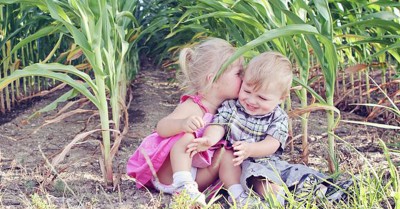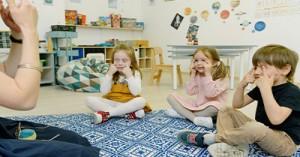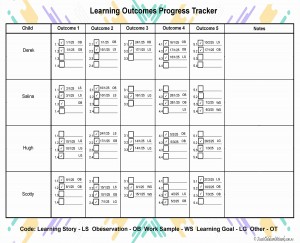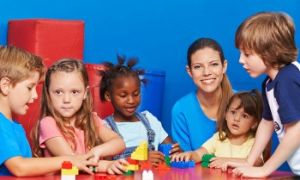The following lists the sub outcomes, examples of evidence when children can achieve each sub outcome and how educators can promote and help children to achieve EYLF Learning Outcome 1: Children Have A Strong Sense Of Identity.
When children feel safe, secure and supported they grow in confidence to explore and learn. In early childhood settings children develop a sense of belonging when they feel accepted, develop attachments and trust those that care for them. As children are developing their sense of identity, they explore different aspects of it (physical, social, emotional, spiritual, cognitive), through their play and their relationships.
Learning Outcome 1: Children Have A Strong Sense Of Identity
1.1 Children feel safe, secure, and supported.
This is evident when children:
- build secure attachments with one and then more familiar educators.
- use effective routines to help make predicted transitions smoothly.
- sense and respond to a feeling of belonging.
- communicate their needs for comfort and assistance.
- establish and maintain respectful, trusting relationships with other children and educators.
- openly express their feelings and ideas in their interactions with others.
- respond to ideas and suggestions from others.
- initiate interactions and conversations with trusted educators.
- confidently explore and engage with social and physical environments through relationships and play.
- initiate and join in the play.
- explore aspects of identity through role play.
Educators promote this learning by:
- acknowledge and respond sensitively to children’s cues and signals.
- respond sensitively to children’s attempts to initiate interactions and conversations.
- support children’s secure attachment through consistent and warm nurturing relationships.
- support children in times of change and bridge the gap between the familiar and the unfamiliar.
- build upon culturally valued child-rearing practices and approaches to learning.
- are emotionally available and support children’s expression of their thoughts and feelings.
- recognize those feelings of distress, fear or discomfort may take some time to resolve.
- acknowledge each child’s uniqueness in positive ways.
- spend time interacting and conversing with each child.
1.2 Children develop their emerging autonomy, inter-dependence, resilience and sense of agency.
This is evident when children:
- demonstrate an increasing awareness of the needs and rights of others.
- be open to new challenges and discoveries.
- increasingly co-operate and work collaboratively with others.
- take a considered risk in their decision-making and cope with the unexpected.
- recognize their individual achievements and the achievements of others.
- demonstrate an increasing capacity for self-regulation.
- approach new safe situations with confidence.
- begin to initiate negotiating and sharing Behaviors.
- persist when faced with challenges and when first attempts are not successful.
Educators promote this learning by:
- provide children with strategies to make informed choices about their behaviours.
- promote children’s sense of belonging, connectedness and wellbeing.
- maintain high expectations of each child’s capabilities.
- mediate and assist children to negotiate their rights in relation to the rights of others.
- provide opportunities for children to engage independently with tasks and play.
- display delight, encouragement and enthusiasm for children’s attempts.
- support children’s efforts, assisting and encouraging as appropriate.
- motivate and encourage children to succeed when they are faced with challenges.
- provide time and space for children to engage in both individual and collaborative pursuits.
- build on the culturally valued learning of individual children’s communities.
- encourage children to make choices and decisions.
1.3 Children develop knowledgeable and confident self-identities.
This is evident when children:
- feel recognised and respected for who they are.
- explore different identities and points of view in dramatic play.
- share aspects of their culture with the other children and educators.
- use their home language to construct meaning.
- develop strong foundations in both the culture and language/s of their family and of the broader community without compromising their cultural identities.
- develop their social and cultural heritage through engagement with Elders and community members.
- reach out and communicate for comfort, assistance and companionship.
- celebrate and share their contributions and achievements with others.
Educators promote this learning by:
- promote in all children a strong sense of who they are and their connectedness to others – a shared identity as Australians.
- ensure all children experience pride and confidence in their achievements.
- share children’s successes with families.
- show respect for diversity, acknowledging the varying approaches of children, families, communities and cultures.
- acknowledge and understand that children construct meaning in many different ways.
- demonstrate a deep understanding of each child, their family and community contexts in planning for children’s learning.
- provide children with examples of the many ways identities and culture are recognized and expressed.
- build upon culturally valued approaches to learning.
- build on the knowledge, languages and understandings that children bring.
- talk with children in respectful ways about similarities and differences in people.
- provide rich and diverse resources that reflect children’s social worlds.
- listen to and learn about children’s understandings of themselves.
- actively support the maintenance of home language and culture.
- develop authentic children’s understanding of themselves.
1.4 Children learn to interact in relation to others with care, empathy and respect.
This is evident when children:
- show interest in other children and being part of a group.
- engage in and contribute to shared play experiences.
- express a wide range of emotions, thoughts and views constructively.
- empathize with and express concern for others.
- display awareness of and respect for others’ perspectives.
- reflect on their actions and consider consequences for others.
Educators promote this learning by:
- initiate one-to-one interactions with children, particularly babies and toddlers, during daily routines.
- organize learning environments in ways that promote small group interactions and play experiences.
- model care, empathy and respect for children, staff and families.
- model explicit communication strategies to support children to initiate interactions and join in play and social experiences in ways that sustain productive relationships with other children.
- acknowledge children’s complex relationships and sensitively intervene in ways that promote the consideration of alternative perspectives and social inclusion.
References:
Understanding EYLF Outcomes, Aussie Childcare Network
EYLF Learning Outcomes, Aussie Childcare Network
How Children Can Achieve Outcomes, Aussie Childcare Network
How Educators Can Promote Outcomes, Aussie Childcare Network







 Here is the list of the EYLF Learning Outcomes that you can use as a guide or reference for your documentation and planning. The EYLF
Here is the list of the EYLF Learning Outcomes that you can use as a guide or reference for your documentation and planning. The EYLF The EYLF is a guide which consists of Principles, Practices and 5 main Learning Outcomes along with each of their sub outcomes, based on identity,
The EYLF is a guide which consists of Principles, Practices and 5 main Learning Outcomes along with each of their sub outcomes, based on identity, This is a guide on How to Write a Learning Story. It provides information on What Is A Learning Story, Writing A Learning Story, Sample
This is a guide on How to Write a Learning Story. It provides information on What Is A Learning Story, Writing A Learning Story, Sample One of the most important types of documentation methods that educators needs to be familiar with are “observations”. Observations are crucial for all early childhood
One of the most important types of documentation methods that educators needs to be familiar with are “observations”. Observations are crucial for all early childhood To support children achieve learning outcomes from the EYLF Framework, the following list gives educators examples of how to promote children's learning in each individual
To support children achieve learning outcomes from the EYLF Framework, the following list gives educators examples of how to promote children's learning in each individual Reflective practice is learning from everyday situations and issues and concerns that arise which form part of our daily routine while working in an early
Reflective practice is learning from everyday situations and issues and concerns that arise which form part of our daily routine while working in an early Within Australia, Programming and Planning is reflected and supported by the Early Years Learning Framework. Educators within early childhood settings, use the EYLF to guide
Within Australia, Programming and Planning is reflected and supported by the Early Years Learning Framework. Educators within early childhood settings, use the EYLF to guide When observing children, it's important that we use a range of different observation methods from running records, learning stories to photographs and work samples. Using
When observing children, it's important that we use a range of different observation methods from running records, learning stories to photographs and work samples. Using This is a guide for educators on what to observe under each sub learning outcome from the EYLF Framework, when a child is engaged in
This is a guide for educators on what to observe under each sub learning outcome from the EYLF Framework, when a child is engaged in The Early Years Learning Framework describes the curriculum as “all the interactions, experiences, activities, routines and events, planned and unplanned, that occur in an environment
The Early Years Learning Framework describes the curriculum as “all the interactions, experiences, activities, routines and events, planned and unplanned, that occur in an environment


